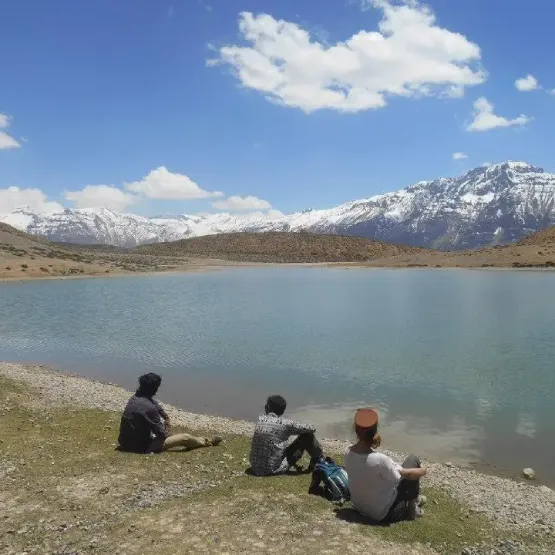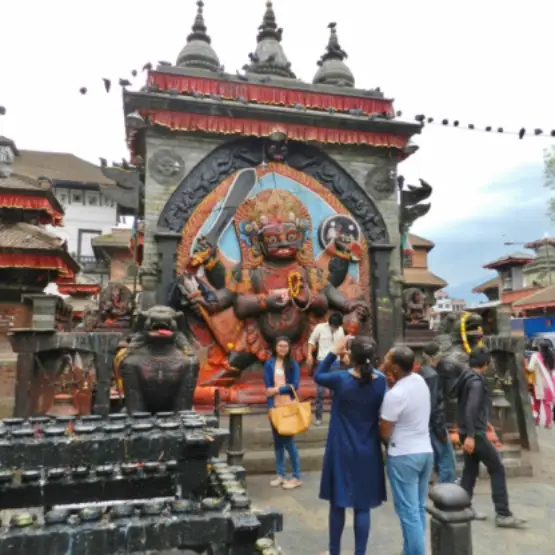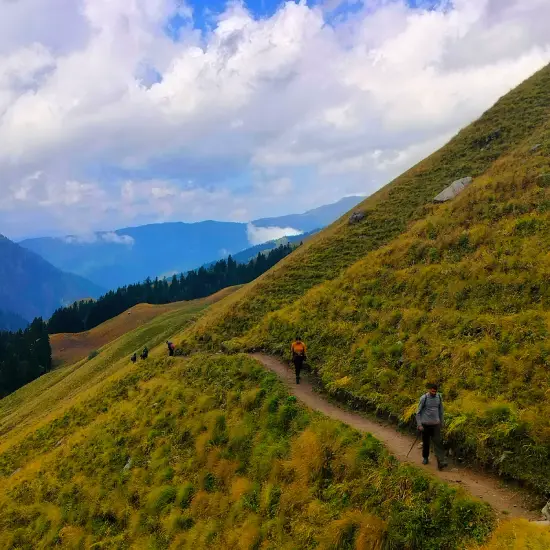Rani Sui Lake Trek
- 2 Nights & 3 Days
- 4200 m
- Easy
- Kullu
Rs 9,500/-
Trek to Saurkundi Lake is one of the few unexplored, lesser known & one of the most spectacular and impressive treks of Kullu Valley, Himachal Pradesh. This trek is on the trail to Kalihani Pass and Bara Bhangal. The trail will give you enough chances to explore the serene snowy Himalayan meadows along with breathtaking views of Himalayan range. With an altitude of 13000 feet above sea level, the beautiful snow covered lake of Saurkundi will wash way all your negativity and fill your mind with the pure Himalayan natural beauty.
Day 1: Manali - Patlikuhal - Mailee Thach
- 3 to 4 hours
- 3400 m to 3870m
We will get up early in the morning, after breakfast we will start Ascending towards Rani Sui Lake. It will take a time of three to four hours to walk through the trail through a lonh strectch of meadow giving viwes of surrounding Himalayan Ranges. After spending some time in the premises of the heart-shaped lake. Descend to Mailee towards your camps that were set last night.
Stay overnight Mailee Thach.
Day 2: Mailee - Rani Sui Lake - Mailee
- 3 to 4 hours
- 3400 m to 3870m
We will get up early in the morning, after breakfast we will start Ascending towards Rani Sui Lake. It will take a time of three to four hours to walk through the trail through a lonh strectch of meadow giving viwes of surrounding Himalayan Ranges. After spending some time in the premises of the heart-shaped lake. Descend to Mailee towards your camps that were set last night.
Stay overnight Mailee Thach.
Day 3: Mailee to Patlikuhal to Manali
- 5 to 6 hours
- 3400 m to 2050 m
We will pack our stuff up and after breakfast, we will descend back from Mailee to Sangchar. After reaching Sangchar we will take a drive back to Patlikuhal and from there we will reach Manali. You can check in at your hotel after reaching Manali and we will see you off here in Manali and hope to see you soon for your next trek with us.
What to pack for the trek ?
| Backpack with rain cover | (50 – 60 ltr) with comfortable shoulder straps |
| Day pack with rain cover | 20 – 30 litre (If off-load opted) |
| Walking stick | Advisable (At least one) |
| Small-size Water Bottle | 2 thermos flask bottles of one litre each, |
| Small size tiffin/lunch box | 1 Nos |
| Snacks | Energy bars, dry fruits, electoral/ORS |
| Personal Medical Kit | Consult your doctor |
| T-Shirt (Synthetic quick dry) | 1 Half sleeves |
| Fleece T-shirt | 1 Nos |
| Wind stopper / Fleece jacket | 1 Nos |
| Windproof Jacket | 1 Nos |
| Down feather / Hollow jacket | 1 Nos |
| Thermal inner (Upper and Lower) | 1 Pair |
| Trek Pant (Synthetic quick dry) | 1 Nos |
| Wind stopper / Fleece Pant | 1 Nos |
| Waterproof gloves | 1 Pair |
| Fleece / woollen gloves | 1 Pair |
| Poncho / waterproof Jacket and pant | 1 Nos |
| Head torch | 1 Nos. (Avoid Hand torch) |
| Sun Cap | Not required |
| Woolen Cap | 1 Nos. |
| Balaclava | 1 Nos |
| Buff | 1 Nos (Woollen) |
| Sunglasses | UV with dark side cover, People who wear spectacles – (A)- Use contact lenses | (B)- Photo chromatic glasses |
| Sunscreen | 1 Nos |
| Moisturiser | 1 Nos |
| Chapstick / Lip balm | 1 Nos |
| Toothbrush and toothpaste | 1 Nos |
| Toilet paper & Wipes | 1 Nos |
| Soap/hand sanitisers | 1 Nos |
| Antibacterial powder | 1 Nos |
| Quick dry towel | 1 Nos |
Points to Remember
- Accommodation: You will be provided tents on a twin-sharing basis including all the basic commodities; mattress- R Value 4, Sleeping bag, and Lamp.
- Meals: You will be provided nutritious meals during the trek to keep you energised and strengthened.
- Transportation: A transfer from the rendezvous to the defined destination will be provided during the trek. This is optional* also.
- Trekking gear: Basic trekking gear; trekking poles, micro-spikes, and gaiters will be provided for the snowy region.
- First Aid: A basic first aid kit will be there in case of a minor injury or illness.
- Personal Clothing: The clothing for the trek must be of your own.
- Meals during transit: When we are transferring you from one point to another, there will be no meals provided from our side.
- Personal Expenses: Any kind of personal expenses are not covered in the trek.
- Emergency Evacuation Cost: The cost for any emergency evacuation stands exclusive from the trek. The participant has to bear the expenses, although supporting staff will be there till you get better again.
Building Strength :
- Spare some time for a 2-3 km walk daily at least 20 days before the trek.
- You can add some breathing exercises to the routine as well.
- You can strengthen your cardiovascular system by cycling and jogging.
Mental Strength :
- Learn to maintain a positive attitude and understanding out in the mountains.
- Prepare yourself to adapt to any change depending on the weather and other uncontrollable situations.
- No intoxication: Any kind of mischievous activity like drinking, or smoking is not permitted on the trek. One who tries to go beyond the bottleneck limits will be sent back to the base camp.
- Indemnity form: It is important to tell about your complete willingness to join this trek by filling out and submitting an indemnity form that can be downloaded from the website.
- Leave no trace technique: We work on the motive of ” take memories and leave no trace.” Throwing any kind of plastic wrappers on the trails is strictly prohibited. If you find any you can pick that up also.
- Quick-drying clothes: Carry some quick-drying inner layers to stay comfortable while walking, specifically during the monsoon season.
- Rain gear: Keep a raincoat or rain jacket along with rain pants for unpredictable showers.
- Sunglasses and Sunscreen: It is a protective layer you need to protect your eyes from the harsh and bright light and strong UV rays of the sun in the mountains.
- Personal Toiletries: It is advisable to carry your limited toiletries to not be a part of environmental deterioration. Please avoid carrying wet wipes as they are non-biodegradable and can leave a ton of microplastic back on the trail
- Your body reacts very differently when you are out in the mountains, this is because of the changing altitude, wind chill factor and air pressure that can lead to a disturbance in your body during the trek, just to avoid that a little bit of hard work will pay you well.
- An open mind is the biggest quality you should keep when you are this far from your home. There can be lots of unexpected things you have to experience for the first time yet a smiling face and courageous personality will help you in every tricky situation
- Throwing any kind of plastic back on the trail will show your intellectual level only and taking it back with you is a step towards preserving what we have.
We will be visiting eco-sensitive areas while trekking, using some small practices can minimize the impact of our visit to these areas. Here are some important yet ignored facts that can help us to keep the environment intact:
Stick to Established Trails
- Stay on Trails: If we use the existing trails to walk on, it will not tamper with the local vegetation and keep the life of microorganisms in the area safe.
- Avoid Shortcuts: If we take shortcuts, it can destroy the plantation and disturb the ecology.
Minimize Campfire Impact
- Using a Stove: We will carry a portable camping stove instead of a campfire to cook food. We won’t light fire unnecessarily just to avoid the destruction of nature and let our bodies adjust to the temperature.
- Fire Regulations: If in any case fire has to be lit, we will use established fire rings to keep the fires small. We will ensure they are completely extinguished before leaving.
Dispose of Waste Properly
- Leave no trace: We will Carry all the trash out with us, including food scraps and packaging. If you find any kind of wrapper or trash on the trail, you can pick it up and hand it to us at the campsite to get it disposed of properly.
- Human Waste: You can use restroom facilities where available. In remote areas, dig a cat hole (6-8 inches deep, at least 200 feet from water sources, trails, and campsites) and cover it properly after use. Using wet wipes is harmful thing for the environment, you can Consider using biodegradable toilet paper.
Respect Wildlife
- Keep a Distance: We can Observe the animals from a distance to avoid disturbing them, chasing them will not be considered as the right thing to do.
- Do Not Feed Animals: Feeding wildlife can disrupt their natural behaviours and diet.
Leave What You Find; Enjoy the things from where they are
- Take Only Memories: Do not take the rocks, pluck plants, and pick other natural objects as you find them to preserve the environment.
- Avoid Disturbing Historical and Cultural Sites: Respect any cultural or historical artefacts you encounter.
Reduce Use of Pollutants
- Eco-friendly Products: You can use biodegradable soap and avoid contaminating water sources.
- Minimize Noise Pollution: Keep noise levels low to avoid disturbing wildlife and other trekkers.
Travel in Small Groups
- Limit Group Size: Trekking is a smaller group that has less impact on the environment.
Educate Yourself and Others
- Learn and Share: Educate yourself about Leave No Trace principles and share this knowledge with fellow trekkers.
Support Conservation Efforts
- Contribute to Local Conservation: You can support organizations and initiatives that are working towards preserving natural areas.
Upcoming Tours
This can be your next getaway for your upcoming vacations

SPITI VALLEY ROAD TRIP
A thrilling journey to the Land of Lamas offering scenic views of the Himalayas, Buddhist culture and architecture .

NEPAL ROAD TRIP
A country on the southern slopes of the Great Himalayan ranges offering you culture, tradition and scenic views.

CHANDARNAHAN LAKES TREK
A trek in the outskirts of Shimla taking you closer to the nature and inner realms of Shimla.
Call us for a free quote
We are here to plan your upcoming adventure, give us a call today!
For travel related queries
Info@highinhimalayas.com
Phone
+91 78765 96443
+91 97360 82255
Address
Cabin No. 501, PC Chambers, Near Jodha Niwas Parking, The Mall Road, Shimla, Himachal Pradesh 171001